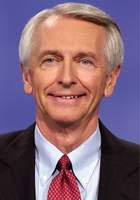Ex-Gov. Beshear 1 of 7 on Opioid Crisis Task Force formed by Bipartisan Policy Center, a Washington, D.C., think tank

By Melissa Patrick
Kentucky Health News
Former Gov. Steve Beshear is one of seven members of the Bipartisan Policy Center‘s new Opioid Crisis Task Force, tasked by the Washington, D.C. think tank with finding evidence-based recommendations to drive down drug-overdose deaths, which have skyrocketed during the pandemic.
“The Bipartisan Policy Center felt it was time, and I agreed with them, to try to develop some bipartisan policy solutions at the federal level to recommend to Congress on how to reduce overdose death rates in the near term, and to increase the efficacy of the longer-term federal response to the opioid crisis,” Beshear told Kentucky Health News.
The Democrat said he has long had a working relationship with the center, serving for several years on its Governors’ Council. He said the bipartisan members of the task force offer “significant expertise” around the issue.
The other members are Dr. Jerome Adams, a former surgeon general; Mary Bono, a former U.S. representative from California; Richard G. Frank, endowed professor of health economics at Harvard University; Dr. Patrice Harris, CEO of eMed and former president of the American Medical Association; Susanna Martinez, former governor of New Mexico; and Donna E. Shalala, a former secretary of health and human services and U.S. representative from Florida.
“The task force will examine drug-overdose trends in the past two years and the main drivers behind the surge, track fiscal year 2020 federal opioid funding and investments from the four Covid-19 emergency relief packages, and analyze the types of treatment services that are being supported across the country and the gaps that exist,” the center said in a news release. Its report, due in early 2022, will “examine treatment disparities in states that expanded Medicaid compared to non-expansion states.”
Beshear, who expanded Medicaid under the Patient Protection and Affordable Care Act when he was governor, noted that the expansion allowed Medicaid to cover treatment for substance-use disorder “for the first time. That’s not to say we had enough of it, or that it was all effective, but certainly to have it available through the expanded Medicaid program proved very beneficial to us.”
Opioid dependence was one of the top five diagnoses made for Kentucky adults and seniors on Medicaid in the federal fiscal year that ended Sept. 30, and buprenorphine-naloxone which is used to treat opioid use disorders, was one of the top five prescribed drugs. About 570,000 Kentuckians gained access to health care in Kentucky through Medicaid expansion in that fiscal year.
Beshear said the task force is timely, given the latest Centers for Disease Control and Prevention study that shows more than 90,000 Americans died from drug overdoses in fiscal 2020, a 29 percent increase from the previous year. In Kentucky, overdose deaths increased 50 percent, the nation’s third highest rate of increase.
The former governor, who is father of the current governor, said the nation has made “tremendous strides” in prevention and treatment of addiction, but not enough: “Our national response is still inadequate, and it’s obvious that it’s inadequate. This may be an opportune time for Congress and a new administration to renew and strengthen the efforts to get ahold of this epidemic and wrestle it to the ground.”
Beshear stressed that more focus needs to be on treatment.
“We have spent quite a bit of time and effort and money on prevention, which is obviously the right thing to do, but from a treatment standpoint, we have fallen short in reaching those who need it,” he said. “We as a country have to finally step up and recognize that this problem will never be resolved without a tremendous effort in the area of treatment.”
He also pointed to the need for additional support for people in recovery.
“You can’t work with a person who wants to overcome their addiction, and then just turn around and put them right back in the same environment that helped to cause that addiction in the first place,” he said. “You have to provide additional support in various ways and we’ve got to figure out how better to do that.”
Beshear said measures to fight the opioid epidemic have found bipartisan support, and “With these new numbers from the CDC, there’s an urgency here to attack this problem more effectively. I think there is a window of opportunity for some bipartisan efforts out of Congress that will help in that regard.”
The Bipartisan Policy Center was founded by former Senate majority leaders Howard Baker and Bob Dole, Republicans, and Tom Daschle and George Mitchell, Democrats.